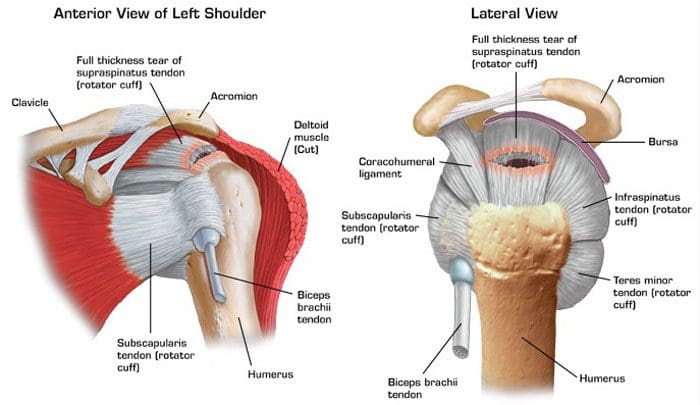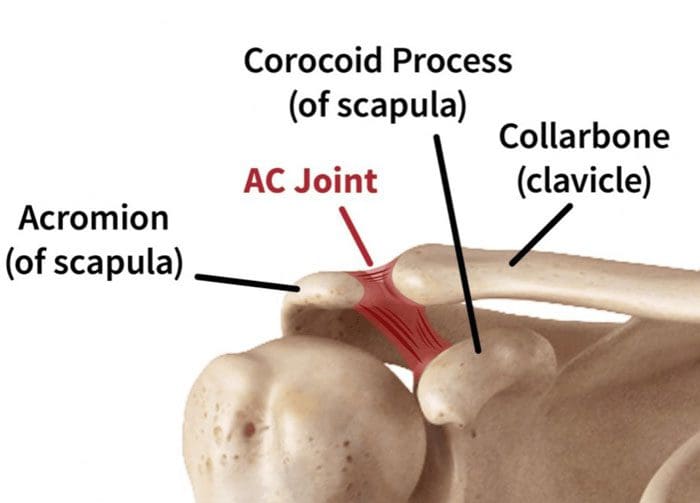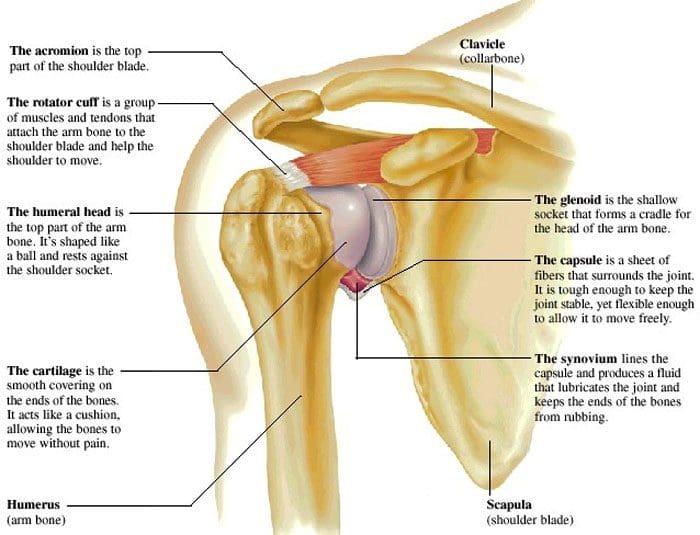Vitamin B12 and Shoulder Injury Recovery
Table of Contents
Vitamin B12 and Shoulder Injuries – Wellness Doctor Rx

Overview
Shoulder injuries commonly affect the muscles, ligaments, and tendons, particularly in individuals who perform repetitive arm movements, lift heavy objects regularly, or participate in sports involving repetitive arm motions. Activities such as swimming, tennis, pitching, weightlifting, and even daily tasks like painting, hanging curtains, or gardening can increase the risk of shoulder injuries.
Table of Contents
- Shoulder Injury Symptoms
- Types of Shoulder Injuries
- Vitamin B12 and Its Role
- Body Composition Analysis
- Disclaimer
- References
Shoulder Injury Symptoms
To assess a potential shoulder injury, consider the following questions:
- Is there stiffness in or around the shoulder?
- Can you rotate your arm through its normal range of motion?
- Does the shoulder feel unstable, as if it might slip or pop out of its socket?
- Is there weakness in the shoulder during daily activities?
If you answer “yes” to any of these, consult an orthopedic surgeon or chiropractor to evaluate the issue and its severity.
Types of Shoulder Injuries
Shoulder injuries are often underestimated, with many individuals ignoring pain or limited motion. The brain can mask discomfort, but untreated injuries may worsen. Common shoulder injury categories include:
Instability
Instability occurs when the shoulder joint shifts or is forced out of position, potentially leading to dislocation. Symptoms include pain when raising the arm and a sensation of the shoulder slipping.
Impingement
Impingement results from excessive rubbing of the shoulder muscles against the acromion (top of the shoulder blade). This often occurs during activities requiring overhead arm motion and can cause inflammation, potentially leading to more severe injuries if untreated.
Specific Injuries
- Bursitis: Swelling of the bursa (fluid-filled sacs cushioning joints) due to repetitive motions, falls, or trauma. Pain is most noticeable during shoulder movement.
- Cartilage Tear: Damage to the cartilage surrounding the shoulder joint from repetitive motions, overextension, or intense force. Symptoms include pain when reaching overhead, weakness, and grinding sensations.
- Rotator Cuff Tear: Damage to the muscles and tendons stabilizing the shoulder, caused by overuse, falls, or aging. Symptoms include nighttime pain, difficulty lifting objects, and a cracking sound during movement.
- Frozen Shoulder: Restricted shoulder movement due to adhesions (abnormal tissue bands) in the joint, often from disuse due to pain or surgery.
- Shoulder Separation: A tear in the ligaments connecting the collarbone and shoulder blade (acromioclavicular joint), often from falls or hard impacts, causing a visible bump on the shoulder.
- Fracture: A break in the collarbone or humerus from accidents or trauma, leading to severe pain, bruising, and difficulty lifting the arm.


Vitamin B12 and Its Role
Rotator cuff injuries often involve damaged connective tissue, potentially linked to impaired collagen synthesis. Vitamin B12 plays a crucial role in collagen formation and helps mitigate inflammation by counteracting pro-inflammatory cytokines. Low B12 levels are associated with increased inflammation, which can exacerbate shoulder injuries.
A study examined whether vitamin B12 levels correlated with rotator cuff tears by measuring B12 and other nutrients (vitamin D, zinc, calcium, magnesium, and folate) alongside homocysteine and blood sugar biomarkers. Homocysteine, a metabolite that accumulates when B12, folate, or B6 is deficient, can damage blood vessels and tissues if not properly detoxified. The study found no significant difference in homocysteine levels but noted a significant difference in B12 levels:
- Healthy Group: Average B12 levels of 627 pg/mL, with no rotator cuff injuries.
- Injured Group: Average B12 levels of 528 pg/mL (16% lower), all requiring surgery for rotator cuff tears.
Vitamin D levels were also lower in the injured group, suggesting a link between nutrient deficiencies and shoulder injuries. Functional nutritional testing is recommended to detect subclinical deficiencies often missed by standard serum tests.
References
- American Society for Surgery of the Hand: Shoulder Pain.
- American Academy of Family Physicians: Shoulder Pain.
- BMC Musculoskeletal Disorders, April 2021.
- Cleveland Clinic: Rotator Cuff Tendonitis Shoulder Tendinitis.
- Monica, James et al. “Acute Shoulder Injuries in Adults.” American Family Physician, vol. 94, no. 2, 2016, pp. 119-27.
- OrthoInfo: Shoulder Pain and Common Shoulder Problems, Rotator Cuff and Shoulder Conditioning Program.
Post Disclaimer
Professional Scope of Practice *
The information on this blog site is not intended to replace a one-on-one relationship with a qualified healthcare professional or licensed physician and is not medical advice. We encourage you to make healthcare decisions based on your research and partnership with a qualified healthcare professional.
Blog Information & Scope Discussions
Welcome to El Paso's Premier Wellness and Injury Care Clinic & Wellness Blog, where Dr. Alex Jimenez, DC, FNP-C, a board-certified Family Practice Nurse Practitioner (FNP-BC) and Chiropractor (DC), presents insights on how our team is dedicated to holistic healing and personalized care. Our practice aligns with evidence-based treatment protocols inspired by integrative medicine principles, similar to those found on this site and our family practice-based chiromed.com site, focusing on restoring health naturally for patients of all ages.
Our areas of chiropractic practice include Wellness & Nutrition, Chronic Pain, Personal Injury, Auto Accident Care, Work Injuries, Back Injury, Low Back Pain, Neck Pain, Migraine Headaches, Sports Injuries, Severe Sciatica, Scoliosis, Complex Herniated Discs, Fibromyalgia, Chronic Pain, Complex Injuries, Stress Management, Functional Medicine Treatments, and in-scope care protocols.
Our information scope is limited to chiropractic, musculoskeletal, physical medicine, wellness, contributing etiological viscerosomatic disturbances within clinical presentations, associated somato-visceral reflex clinical dynamics, subluxation complexes, sensitive health issues, and functional medicine articles, topics, and discussions.
We provide and present clinical collaboration with specialists from various disciplines. Each specialist is governed by their professional scope of practice and their jurisdiction of licensure. We use functional health & wellness protocols to treat and support care for the injuries or disorders of the musculoskeletal system.
Our videos, posts, topics, subjects, and insights cover clinical matters and issues that relate to and directly or indirectly support our clinical scope of practice.*
Our office has made a reasonable effort to provide supportive citations and has identified relevant research studies that support our posts. We provide copies of supporting research studies available to regulatory boards and the public upon request.
We understand that we cover matters that require an additional explanation of how they may assist in a particular care plan or treatment protocol; therefore, to discuss the subject matter above further, please feel free to ask Dr. Alex Jimenez, DC, APRN, FNP-BC, or contact us at 915-850-0900.
We are here to help you and your family.
Blessings
Dr. Alex Jimenez DC, MSACP, APRN, FNP-BC*, CCST, IFMCP, CFMP, ATN
email: [email protected]
Licensed as a Doctor of Chiropractic (DC) in Texas & New Mexico*
Texas DC License # TX5807
New Mexico DC License # NM-DC2182
Licensed as a Registered Nurse (RN*) in Texas & Multistate
Texas RN License # 1191402
ANCC FNP-BC: Board Certified Nurse Practitioner*
Compact Status: Multi-State License: Authorized to Practice in 40 States*
Graduate with Honors: ICHS: MSN-FNP (Family Nurse Practitioner Program)
Degree Granted. Master's in Family Practice MSN Diploma (Cum Laude)
Dr. Alex Jimenez, DC, APRN, FNP-BC*, CFMP, IFMCP, ATN, CCST
My Digital Business Card




Comments are closed.